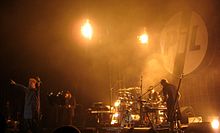Post punk
|
Post punk
|
|
| Development phase: | Late 1970s to early 1980s |
| Place of origin: |
|
| Pioneers | |
| Public Image Ltd. · Wire · Siouxsie and the Banshees · Joy Division | |
| Instruments typical of the genre | |
| Electric guitar, electric bass, drums, synthesizer, sequencer, drum computer | |
| Subgenres | |
| Gothic Rock · NDW · Punk-Funk | |
Post-punk is the name of a music movement that first and above all in the United Kingdom in the late 1970s from or early 1980s punk emerged.
In a broader sense, this term can also be used to describe all the trends in alternative music of this time, which began to move stylistically away from the previously dominant punk, without losing the affinity and similarity to punk or completely breaking with tradition.
The break with traditional elements from rock is characteristic of the genre, which is why post-punk is considered to be experimental and colorful. Among other things, components of krautrock , dub , disco and also electronic music (such as synthesizers ) are used.
Origin of the term
The term post-punk first appeared in the British music magazine Sounds in 1977 to describe the music of Siouxsie and the Banshees . In 1980 the critic Greil Marcus wrote in a Rolling Stone article about the "British post-punk pop avant-garde". He used it to describe bands like Gang of Four , The Raincoats and Essential Logic .
background
While some critics use the term "post-punk" synonymously with New Wave , Independent or Dark Wave , others differentiate between the more poppy New Wave of bands such as Duran Duran and Visage and the rougher post-punk.
Typical post-punk representatives were or are Blood on the Saddle , Public Image Ltd. , Siouxsie and the Banshees , Talking Heads , The Southern Death Cult , Wire , Foetus , DAF , Malaria! , Gang of Four , Joy Division , Bauhaus , The Stranglers , Killing Joke , The Sound , The Chameleons , Magazine , The Birthday Party , Cocteau Twins , The Fall , the early U2 , The Cure , And Also the Trees , Death in June and The Sisters of Mercy . The post-punk bands saw themselves as a further development of the negative and tendentially apolitical punk bands, whose “ no-future ” philosophy was replaced by the constructive, sometimes political and progressive post-punk bands. They tried to determine their own future. They expanded punk through the use of punk-atypical instruments (e.g. synthesizers ), the inclusion of other playing styles such as funk and blues , a higher standard in their lyrics, through more complex chord progressions or the underlying concept of the band. In addition, in the late 1980s and early 1990s post-punk played an important role in the development of alternative rock , especially in some crossover bands.
The term "post-punk" is currently playing a bigger role again because several commercially successful bands such as Franz Ferdinand , Interpol and Arctic Monkeys are orienting themselves towards the music and aesthetics of post-punk. “Post-Punk” is also used in a broader sense for numerous different forms of music that developed after the aesthetic musical change brought about by punk, including Hardcore , Oi! , 2-tone ska , gothic , death rock , cold wave and neofolk .
No wave
While the term "post-punk" was initially used for British bands , there was at the same time a current that concentrated mainly on New York and was called " No Wave ". This name was considered an allusion to the then commercially successful New Wave movement. In terms of content, post-punk and no wave are very similar, although no-wave artists often had a stronger reference to the artistic avant-garde and more weight was often attached to pure performance than was usual in post-punk. James Chance , Lydia Lunch and Material are considered to be representatives of this trend .
See also
literature
- Judith Ammann: Who's been sleeping in my brain? Interviews post punk . Suhrkamp-Verlag, Frankfurt a. M. 1987, ISBN 3-518-11219-8
- Simon Reynolds: Rip It Up And Start Again - Throw it all down and start over (Postpunk 1978-1984) . Hannibal Verlag, Höfen 2007, ISBN 978-3-85445-270-6 (Original edition: Rip It Up And Start Again - Post Punk 1978–1984 )
Individual evidence
- ^ Nicholas Lezard: Fans for the memory . The Guardian. Retrieved June 9, 2016.
- ↑ Stephen Thomas Erlewine : Post-Punk . Allmusic . Retrieved June 9, 2016.
- ↑ Kitty Empire: Never mind the Sex Pistols - Rip It Up And Start Again: Post-Punk 1978-1984 - book review . The Guardian. April 17, 2005. Retrieved June 9, 2016.
- ↑ Dave Thompson: Alternative rock . Backbeat Books, 2000, p. 60
- ^ Rolling Stone , July 24, 1980
- ^ The Southern Death Cult . on The Archive
